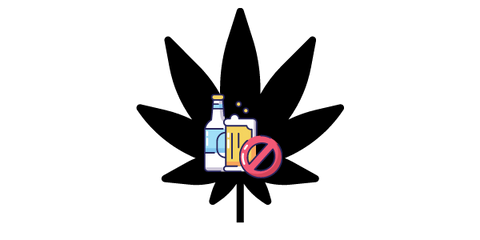The United States is a country plagued by addiction. In 2018 alone, we saw 67,367 lives extinguished by overdose. The vast majority of these ODs resulted from synthetic opiates, like Oxycontin, or the incredibly potent and dangerous Fentanyl. Opiate abuse is so rampant in America that it has been deemed a bona fide crisis.

While the immediacy of the opioid epidemic is unignorable, there are other addictive substances that many of us use every day. Who reading this can’t get their day started without a jolt of caffeine? Can you imagine making it through the workday without a smoke break? How often do you find yourself unwinding from a long day with a drink? Does that glass of red wine with dinner usually turn into a few?
Addictive substances are all around us. As cannabis takes on a more mainstream role, we should examine where the plant fits in the world of addiction. Is cannabis addictive like opiates, or can it actually be used to help addicts recover?
Is Cannabis Addictive?

Whether or not cannabis is truly addictive is one of the biggest debates raging on in the community today, and it’s difficult to give a simple yes or no answer. Ultimately, it comes down to how you define addiction.
Cannabis certainly isn’t addictive in the way opiates or booze are. There’s no risk of overdosing on marijuana, and quitting cold turkey won’t leave users with life-threatening delirium tremens.
However, it’s not correct to say that cannabis has no physical withdrawal symptoms whatsoever or that THC can’t be habit-forming to the point of fostering dependency.
Dr. Melanie Bone told Weedmaps, “Another often-heard comment is that marijuana is safer than other substances because it is not truly addictive, and sudden stopping may be uncomfortable but won't result in dangerous withdrawal the way alcohol and opiates do. While there is truth to this, there is definitely a risk of dependence, as well as difficulty with managing withdrawal.” She continues, “Consumers can become dependent on it, and physical withdrawal does occur, but it is not life-threatening, like opiate withdrawal. In addition, there are many who can stop their use and restart without a problem.”
Cannabis addiction doesn’t present with the severity of other types of addiction, which may be why you will rarely see it referred to as such. Instead, those who have trouble managing their cannabis use are considered to have Cannabis Use Disorder (CUD).
Can Cannabis Help With Other Addictions?
Addiction is a lifelong struggle and can’t simply be turned on or off. That’s why many recovery programs focus on harm reduction models. It’s a practical, common-sense concept. For example, you might overhear in a AA meeting a bedraggled man smoking a cigarette say, “quit what’s killing you the fastest first.”
It’s in the spirit of harm reduction that cannabis may be most helpful in assisting addicts to overcome their struggles. If you can exchange a more dangerous drug like cocaine for cannabis, you’ve effectively reduced the potential harm done to your body.
Cannabis and Opiate Addiction
In some instances, however, cannabis may actually help reverse the damage done to the brain from extended opiate use. Dr. Yasmin Hurd has researched the effects of heroin on our endocannabinoid system. She found that heroin use damages our neurotransmitters and cannabinoid receptors, which are responsible for a whole slew of necessary bodily functions. Her research has determined that cannabis can actually repair this damaged system.

While drugs like opiates have a negative effect on the part of our brains that govern anxiety and inhibition control, cannabis can conversely have a positive effect. This can have a drastically positive impact on recovery efforts.
Cannabis and Alcohol Addiction
It’s kind of strange just how culturally accepted alcohol use is when you stop to think about it. Not drinking is actually considered to be more unusual in today’s society.
Alcohol has become so commonplace that we don’t even think of it as a drug, but in reality, it has much more potential to be harmful than the heavily stigmatized cannabis plant. In an effort to stay healthier, many people are taking on a new lifestyle trend known as going Cali-sober, where they replace alcohol entirely with cannabis. Instead of cracking a beer after work, why not enjoy a calming puff of CBD, like in our Stelo™ Relax.

Preliminary research into the efficacy of replacing alcohol with cannabis in addicts has been mostly inconclusive. However, there’s plenty of anecdotal evidence of people using cannabis to get over their boozing. Famously comedian and podcaster Joey Diaz has used marijuana to get over his decades’ long struggle with cocaine and booze.
CBD and Cigarette Addiction
It’s often said that cigarettes are harder to quit than heroin.
A huge part of what makes putting down the pack so hard is the ubiquity of smokers’ use. You smoke when you drive. You smoke after sex. You smoke when you finish eating. You smoke at work. You smoke with friends. You smoke alone.
This creates a pattern of habit that can be incredibly hard to break. By using CBD to quit smoking cigarettes, you can satisfy those cravings without all of the cancer-causing carcinogens found in tobacco.
CBD itself may actually help quell nicotine urges. One study tested 24 smokers, giving half a CBD inhaler to use when they felt the urge to smoke, and the other half a placebo. They found a ~40% decrease in the number of cigarettes smoked in the group given the CBD, while the placebo group saw no change. While these results in themselves aren’t enough to claim that CBD helps reduce nicotine cravings, it is certainly promising.



